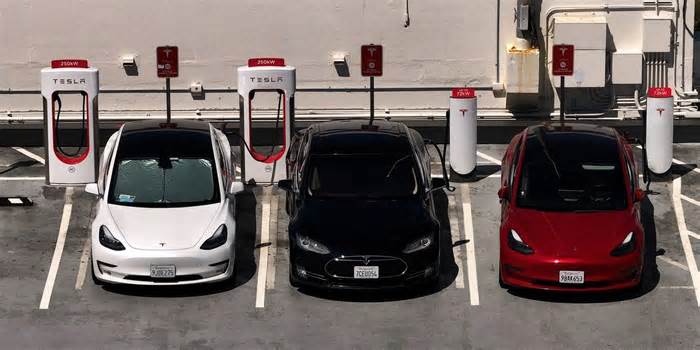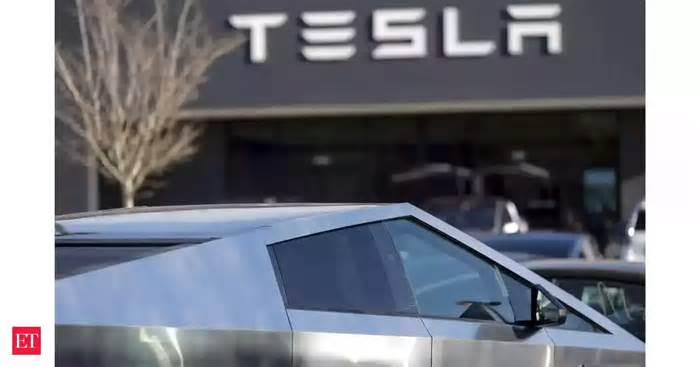
3 people face federal charges for Tesla attacks. Are such acts domestic terrorism?
- by WFAE
- Mar 20, 2025
- 0 Comments
- 0 Likes Flag 0 Of 5

/ AP
People protesting Musk's actions in the Trump administration hold signs outside a Tesla showroom in Seattle on Feb. 13
But in some cases — including one of the people included in Bondi's announcement Thursday — the protests have taken a more violent turn. Two people have been arrested and are now facing state and federal charges tied to two separate attacks on a Tesla dealership in Loveland, Colo., which involved throwing Molotov cocktails at the cars and, in one instance, spray-painting expletive-ridden messages on the showroom's windows. No one was killed or injured during either incident.
Who is facing charges?
Lucy Grace Nelson, Daniel Brendan Kurt Clarke-Pounder and Adam Matthew Lansky are facing charges tied to their alleged vandalism of Tesla cars and dealerships in Colorado, South Carolina and Oregon, respectively.
Nelson is facing two charges of possession of an unregistered firearm and the malicious (attempted) destruction of property. She could face up to 30 years in prison.
Court documents allege that Nelson traveled to a Tesla dealership in Loveland, Colo., on multiple nights in January and February, allegedly lighting Molotov cocktails and throwing them in the dealership's parking lot and spraying graffiti on the building's windows and walls.
Nelson's attorney, Mary V. Butterton, declined to comment on her client's case.
Lansky is facing one charge of unlawful possession of an unregistered firearm. But an affidavit alleges he is also responsible for throwing Molotov cocktails and shooting a gun at Tesla vehicles and dealership facilities in Salem, Ore., on at least two separate occasions in January and February. Lansky's attorney, Mark Patrick Ahlemeyer, didn't immediately respond to a request for comment.
Court documents allege that witnesses say they saw Clarke-Pounder on March 7 using red spray paint to write obscenities against Trump and "Long Live Ukraine" on a Tesla charging station parking spot in North Charleston, S.C. Clarke-Pounder then allegedly started lighting bottles on fire and throwing them at the Tesla charging stations, according to court documents. He's facing one charge of arson affecting interstate commerce.
Patrick Chisum, Clarke-Pounder's attorney, told NPR that Clarke-Pounder is feeling overwhelmed.
"He's being accused of something that's very, very serious. And I think that the realization of how serious it's being taken, especially with Attorney General Bondi's statements, is kind of becoming self-evident. Both he and his family are very, very concerned and very scared," Chisum said.
He added that his client "is a troubled young man who's been suffering from multiple mental health issues."
What falls under 'domestic terrorism'
The U.S. doesn't have a stand-alone federal domestic terrorism law. But at least 32 states and Washington, D.C., have their own state-level domestic terrorism laws. The FBI defines domestic terrorism as, "Violent, criminal acts committed by individuals and/or groups to further ideological goals stemming from domestic influences, such as those of a political, religious, social, racial, or environmental nature."
People might look at vandalism at a Tesla dealership and question whether it's terrorism, says Hoffman.
But going back to the 1990s, the FBI, as the lead agency responsible for investigating terrorism in the United States, has investigated acts of vandalism and arson like those committed by eco-terrorism groups and treated them as domestic terrorism, he says.
One of the more famous cases of eco-terrorism was committed by the group known as The Family. The FBI says the group has been linked to more than 40 criminal acts between 1995 and 2001, including arson and vandalism, causing more than $45 million in damages. The group's most notorious act was the 1998 arson attack on a ski resort in Vail, Colo. — which caused around $26 million in damages.
"To me, regardless of one's opinions of Tesla cars, and its owner, this isn't new," Hoffman says.
A key element in determining what is domestic terrorism is the intent of the perpetrator. That can include a desire to intimidate or coerce a civilian population, influence government policy, or affect government conduct, says Faiza Patel, senior director of the Brennan Center For Justice's Liberty and National Security Program.
And the intent of the Tesla vandals falls under this umbrella, she says.
"The whole point ... is that [the vandals] are trying to influence government conduct. Everybody knows that Elon Musk is not only a federal employee, but is at the center of a lot of controversies about what the government is doing right now," Patel says.
The act would also have to fall under one of the laws listed in the federal code as a domestic terrorism offense. These include attacks that use certain types of weapons — for example, weapons of mass destruction — or include acts such as hostage-taking or involve special federal interest, such as attacks on federal officials.
Other protesters have spray-painted swastikas and smashed windows of Tesla showrooms. But Patel says it's unlikely authorities will consider those cases of petty vandalism — or of someone keying a Tesla — to be domestic terrorism.
Ethan Miller / Getty Images
Please first to comment
Related Post
Stay Connected
Tweets by elonmuskTo get the latest tweets please make sure you are logged in on X on this browser.






 Energy
Energy


















